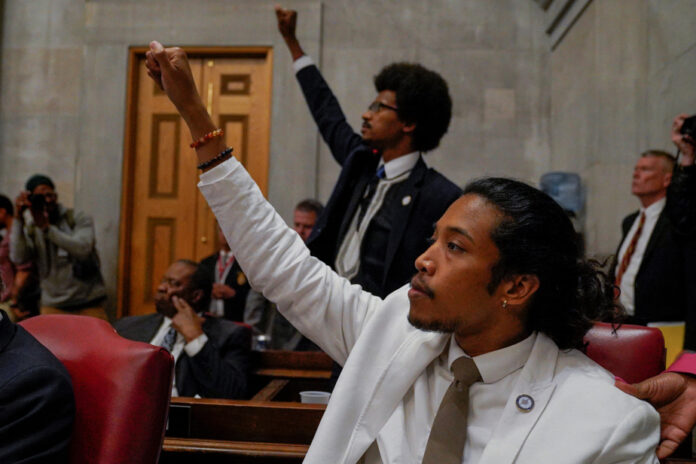(Nashville) Two former elected Democrats from Tennessee who were previously expelled by their Republican colleagues wish to be reinstated, or otherwise reelected.
Justin Jones and Justin Pearson took part in a protest inside the Tennessee Capitol last week to demand better gun control, following a shooting in Nashville in which three children and three adults were killed.
The Nashville Metropolitan Council is likely to vote for the return of Justin Jones during a special meeting on Monday. For its part, the Shelby County Commission plans to announce soon when it will meet to fill the position left vacant by the expulsion of Justin Pearson, who will also have the possibility of regaining his seat on the occasion of a ballot.
The two former lawmakers told NBC’s Meet the Press Sunday that they wanted to return to their jobs. By-elections for their seats, the dates of which have yet to be decided, will follow in the coming months.
President Joe Biden spoke with MM. Jones and Pearson and Vice President Kamala Harris visited them in Nashville.
In separate votes Thursday, the Republican majority ejected the two black men, a move that left about 140,000 voters in predominantly black districts of Nashville and Memphis without representation in the House.
A third elected Democrat who participated in the protest, Gloria Johnson of Knoxville, was spared by a margin of one vote. Ms. Johnson is white, and the difference between the result of her eviction vote and that of her black colleagues sparked an outcry. Republican lawmakers who chose to vote against deporting Ms. Johnson cited the fact that her role in the protest was less – she did not speak into a megaphone, for example.
House Speaker Cameron Sexton has denied any accusations of racism.
Republican Party leaders said the expulsions — used only a handful of times since the American Civil War — were necessary to avoid setting a precedent that disrupting lawmakers during House proceedings through protests would be tolerated.
Mr. Pearson said the place is a “toxic work environment”. He cited criticism he received for wearing a black dashiki ― a garment originating from West Africa ― instead of a jacket and tie during his induction in February, the month of black history.
“It’s a way of shutting us out of the institution because they’re afraid of the changes that are happening in our society and the voices that are being raised,” Mr. Pearson argued on the set of Meet the Press.


















